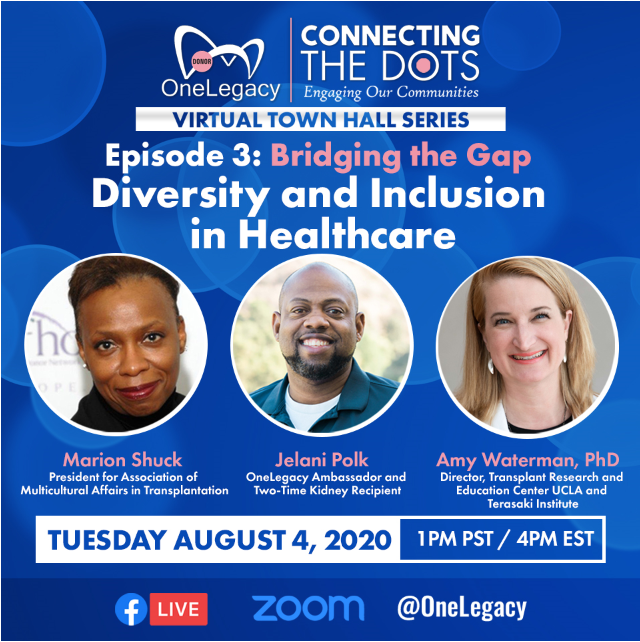By Erica Ho, Research Associate
On Wednesday, August 4, Dr. Amy Waterman was invited to speak at OneLegacy’s monthly Connecting the Dots Virtual Town Hall. OneLegacy is an organization dedicated to helping people navigate organ, eye, and tissue donations by offering coordination and support services. The topic for this discussion, in accordance with National Minority Donor Awareness Month, was improving diversity and inclusion in healthcare to spread awareness about organ donation among minority groups. Dr. Waterman joined Marion Shuck, President for Association of Multicultural Affairs in Transplantation, and Jelani Polk, a OneLegacy Ambassador and two-time kidney recipient.
During the hour-long chat, Shuck provided facts showing how ethnic minorities are less likely to receive transplants, Polk shared personal experiences as a minority and transplant recipient, and Dr. Waterman shared her knowledge on how diversity can be improved in the transplant field. As the guest host, Shuck led the discussion, beginning with COVID-19 updates and reminding the live viewers to be mindful of their health during these uncertain times. Dr. Waterman also took a moment to inform viewers about TREC’s COVID-19 Kidney/Transplant Listening & Resource Center, where anyone can call to ask questions related to COVID-19 and their kidney health. Shuck then interluded to National Minority Donor Awareness Month, emphasizing how important it is for the transplant community to include minorities in important discussions. At this point, Shuck invited Polk to share his experiences as a 2-time kidney recipient and OneLegacy Ambassador.
Polk shared that his kidneys started to fail when he was only 13 years old. In high school and college, he was an aspiring athlete and all he really knew about dialysis was that his grandmother had died while on it. He spent over 5 years on dialysis before finally receiving a kidney from a deceased donor. This kidney functioned for 4 years before his body began to reject it. Thankfully, he was able to find a program that could help with his sensitivity issues and he eventually received a living donation from his cousin! He also talked specifically about how important it is for him to be a voice for Black men in the transplant community and his role as a bridge between healthcare providers and kidney patients. This is especially important to encourage diversity in healthcare as well as giving patients a role model they can trust and relate to.
Dr. Waterman then contributed her thoughts on the donor shortage in the country. As someone who works directly with transplant coordinators and helps people get transplants, she encourages those seeking donors to be as empowered as possible through self-education and meaningful discussions. She mentioned Explore Transplant as a great learning resource for donors and recipients, since everyone should have equal access to evaluation, and transplantation is not limited to your race or gender. She also invited everyone to watch the trailer for the Living Donation Storyteller Project. Dr. Waterman invited viewers to share their stories on the website because “it’s really important when you’re facing these challenges to meet people who look like you”.
The Virtual Town Hall discussion concluded with a Q & A session where Polk answered more questions on his current health status and Dr. Waterman spoke again about empowerment through education and the need for more open discussions about transplant within unique communities. She emphasized that “we need a visible public message transformation to show that living donation is possible, and good people do it every day.” As a community, we should be always pursuing ways to include more people in our discussions. Everyone deserves the same chance at finding a donor and living a long, healthy life!
- For more about OneLegacy, visit onelegacy.org.
- To view the Living Donation Storytelling Project, visit explorelivingdonation.org.
- A full replay of the Virtual Town Hall can be viewed on OneLegacy’s Facebook page by clicking here.

